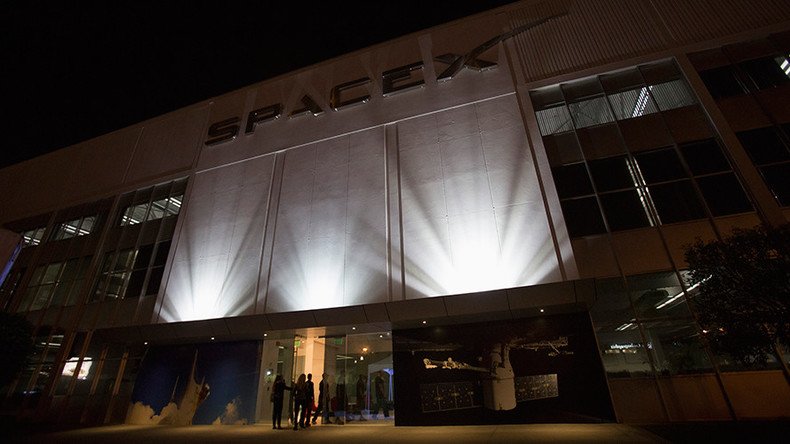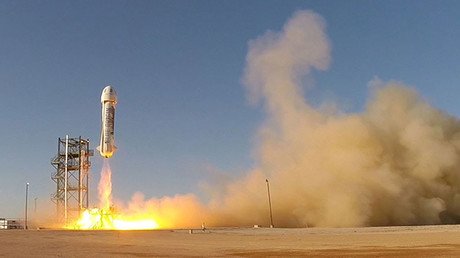Trust-busting beyond Earth: SpaceX breaks Lockheed-Boeing grip on military launches

SpaceX has been awarded an $82.7 million contract by the US Air Force so it can launch a GPS satellite into space. It’s the first time in more than 10 years that a company other than Lockheed Martin and Boeing will be responsible for a military space launch.
The satellite is currently scheduled to launch in May 2018 out of Florida, according to Reuters.
The contract “achieves a balance between mission success, meeting operational needs, lowering launch costs, and reintroducing competition for National Security Space missions," Lieutenant General Samuel Greaves, who is in charge of the Air Force's Space and Missile Systems Center, said in a statement.
The flight of #RedDragon: SpaceX to send capsule to Mars as early as 2018 https://t.co/UpnyYQp337pic.twitter.com/uDi3NNMCZi
— RT America (@RT_America) April 27, 2016
While the news is obviously a big win for SpaceX – it’s the company’s first military launch contract – perhaps the bigger news is that the military space business monopoly enjoyed by the United Launch Alliance, a joint operation between Lockheed and Boeing, appears to be over.
At first blush, the victory for SpaceX seems to be a no-brainer. The roughly $83 million contract is significantly cheaper than what ULA has offered the Air Force in the past. A recent report by financial analysts at Motley Fool found that ULA representatives were not allowed to offer space launches for anything less than $125 million, and that they usually end up near $200 million after all costs are added into the equation.
Notably, ULA did not even compete for the latest Air Force contract, Reuters stated. The company blamed accounting issues as well as trade sanctions that have affected its ability to purchase the Russian-made rocket engines it uses in its spacecraft. It also highlighted the cheaper rates that SpaceX offered.
According to the Motley Fool report, SpaceX can currently offer launches for as low as $61 million.
SpaceX founders create new company to launch hundreds of micro-satellites https://t.co/QJadAVP0RJpic.twitter.com/YEs0jgJ1eM
— RT America (@RT_America) April 27, 2016
Of course, cutting prices for space launches has been one of the main goals for SpaceX, which is banking on reusable rocket technology to dramatically decrease costs. In April, the company successfully landed a reusable Falcon 9 rocket on a platform floating at sea, a development that came after it safely landed a rocket on land.
If the reusable rocket technology proves to be reliable, then SpaceX could conceivably cut launch costs by 30 percent.
Yet despite the apparent advantages SpaceX offered, it had to fight in court to become eligible to bid on Air Force contracts. The company was not permitted to bid on a 2014 deal worth $7.2 billion that ultimately awarded ULA 26 launches, CNN reported, and it filed a lawsuit over the issue arguing the rules were unfair. In a settlement, the military agreed to create more competitive opportunities for other companies to bid for government contracts.
In March, the Pentagon’s internal watchdog opened an investigation into the military’s contract bidding process in order to determine whether it was biased to favor ULA, Space Flight News reported. The probe centers on comments made last year by Brett Tobey, former vice president of engineering at ULA, who stated that the federal government was unhappy with the company’s decision to sit out the latest bid with SpaceX. He said the Pentagon “felt that they had bent over backwards to lean the fill to our advantage.”
“We saw it as a cost shootout between us and SpaceX, so now we’re going to have to figure out how to bid these things at a much lower cost,” he said. “The government can’t just say, ‘ULA has a great track record, they’ve done 105 launches in a row with 100 percent mission success, and we can give it to them on a silver platter even though their costs are two or three times as high.'”
Now, another eight Air Force contracts will be up for grabs through 2018, though it’s unclear who will bid for those.
In order to try and compete with SpaceX, Motley Fool reported that ULA is attempting to streamline its operations. It is considering laying off about 25 percent of its staff through 2017 and planning to retire two of its spacecraft (the Delta IV and the Atlas V) in favor of the Vulcan rocket currently in the works. If successful, ULA expects to offer space launches at just under $100 million. That’s much cheaper than $200 million, but still more expensive than what SpaceX is currently offering without factoring in its reusable rocket tech. It’s also more expensive than the $77 million Airbus is hoping to offer when its Ariane 6 rocket is ready to go in 2020.












